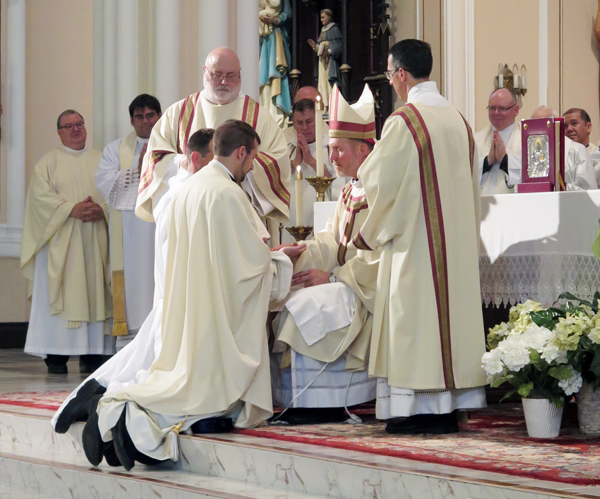By Fr. Joseph Sia
Something very important is about to happen in our diocese and all Catholics in Southeast Iowa ought to be excited for it! I am referring to the Mass of Conferral of Holy Orders (also known as “ordinations”) which will be celebrated Saturday, June 1, at 10 a.m. in Sacred Heart Cathedral in Davenport.

Bishop Thomas Zinkula rubs sacred chrism oil into the hands of Father John Lamansky June 30, 2018, at Sacred Heart Cathedral in Davenport. Fr. Lamansky was ordained a priest for the Diocese of Davenport and Terry Ball was ordained a deacon. Assisting the bishop are Deacon David Montgomery, left, and Deacon Chris Kabat.
This will be a moment of hope for us all. Two men are scheduled to be ordained as priests and one man as transitional deacon. I strongly encourage all of you to attend this Mass and invite your families and friends as well. If you are not able to go that day, you may come the evening before, May 31, at 5:15 p.m., to Sacred Heart Cathedral where we will pray vespers followed by Mass and then a holy hour of adoration dedicated to these men. Of course, you are welcome to attend both if you can!
Since ordination Masses don’t happen frequently, I thought I’d do a “Q&A” on frequently asked questions about the sacrament of holy orders:
Q: Why is this sacrament called “ordination?”
A: The word “ordination” [ordinatio] was used in ancient Rome to signify the appointment of a citizen to a civil office and was adopted by the church to signify the consecration of a faithful to an ecclesiastical ministry. Those who receive this sacrament are enrolled into their respective groups [ordo] of deacon, priest and bishop.
Q: What are the three degrees of the sacrament of holy orders?
A: These are the diaconate, presbyterate and episcopate. Deacons receive the first degree; priests, the second; while bishops possess the fullness of ordination by receiving the third degree.
Q: Who is the minister of ordination?
A: The bishop, who can confer the three degrees. While a bishop can ordain a deacon and a priest on his own accord, he needs the mandate from the pope to ordain another bishop.
Q: Who can receive the sacrament of holy orders?
A: A male Catholic whose vocation has been approved by the church and who possesses the prescribed requirements and is free of any canonical impediment.
Q: What is the matter of the sacrament?
A: The laying on of hands by the bishop. This is in accordance with Acts 6:6, “They presented these men (the first seven deacons) to the apostles who prayed and laid hands on them.”
Q: What is the form of the sacrament?
A: The prayer of consecration, which the bishop prays while laying (or extending) his hands over the candidate. There are specific words for the ordination of a deacon, priest and bishop.
Q. What are the signs of office that the ordinand receives at ordination?
A. 1. The deacon receives the Book of the Gospels, which represents his mission to preach the Good News.
2. The priest receives the chalice and paten, which represent his power to celebrate the Eucharist.
3. The bishop receives the ring, which represents his fidelity to the church; the miter, symbol of his authority, and the crosier, symbol of his jurisdiction.
Q. What are the other rituals observed at a Mass of Ordination, especially for a priest?
A. Among the other interesting things that happen at a Mass of Ordination:
1. The bishop anoints the hands of the new priest with sacred chrism.
2. The new priest is vested with a stole and chasuble by a brother priest.
3. The new priest concelebrates his first Mass with the bishop.
4. The new priest gives his first blessing to the bishop and others present.
Q: Is there a plenary indulgence associated with receiving the first blessing of a priest?
A: Not with the first blessing but, rather, with attendance at his first Mass (together with the other conditions — confession, receiving Communion, praying for the intentions of the Holy Father and being truly sorry for all one’s sins).
(Fr. Sia is vocations director for the Davenport Diocese. Contact him at (563) 888-4255 or sia@davenportdiocese.org.)











